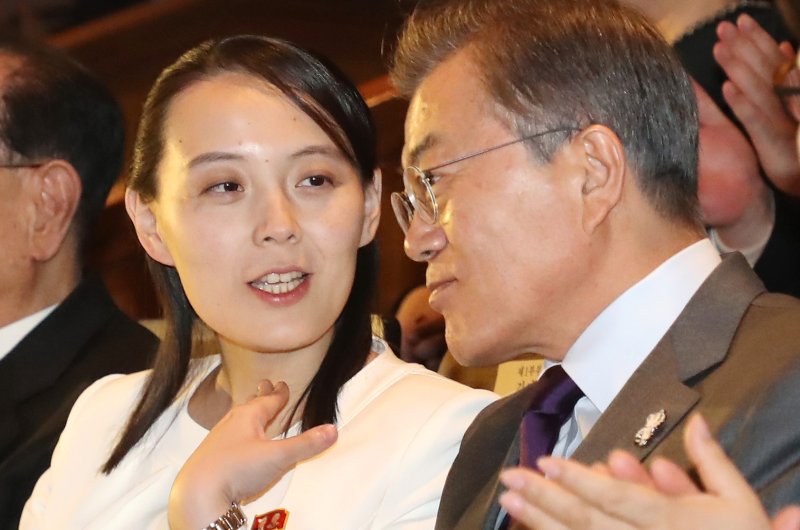South Korean President Moon Jae-in (R) listens to the sister of North Korean leader Kim Jong-un, Kim Yo-jong, as they jointly attend a concert, staged by the North's Samjiyon Orchestra, at the National Theater of Korea in Seoul, South Korea, 11 February 2018. Photo Courtesy of Yonhap.
SEOUL, Feb. 12 (UPI) -- The South Korean government says it will cooperate with North Korea to arrange President Moon Jae-in's trip to Pyongyang, expressing hope for continued progress in improving inter-Korean relations.
This comes after North Korean leader Kim Jong Un's younger sister Kim Yo-jong delivered an invitation to visit the North to Moon during their meeting on Friday.
The younger Kim came to the country as part of the North's 22-member high-level delegation to the South, which also included the North's ceremonial head of state Kim Yong-nam.
The Unification Ministry said Sunday expressed optimism, saying the exchange marked the first time a member of the North's Kim family had stepped foot in South, since the two Koreas were divided after the 1950-53 war.
"North Korea has demonstrated it has very strong intentions to improve inter-Korean relations and, if necessary, it can take drastic, unprecedented actions," a ministry official said.
He added the visit had laid the ground work "to enable comprehensive discussions on contentious issues surrounding the peninsula and the status of North-South ties.
"Seoul will push for the normalization of cross-border ties while maintaining the continuinty of dialogue between the two sides," he said.
President Moon has reportedly called for efforts to create conditions to arrange a meeting with Kim Jong Un, which would mark the first inter-Korean summit in more than a decade.
The first inter-Korean summit took place in June 2000, in Pyongyang, between South Korean President Kim Dae-jung and late North Korean leader Kim Jong Il.
The former liberal South Korean leader offered an olive branch to the North in January that year, then announced in his Berlin Declaration that Seoul would provide economic support to Pyongyang. Kim Dae-jung was awarded a Nobel Peace Prize, the same year, although investigations later revealed he'd paid hundreds of millions of dollars to hold the historic meeting.
His Sunshine Policy of reconciliation with the North was continued by his successor Roh Moo-hyun who held a summit with Kim Jong Il in Oct. 2007.
The two heads of state struck up an eight-point peace agreement, pledging to end the armistice between the Koreas and establish permanent peace.
Earlier in 2007, the North agreed to begin disarmament of its nuclear facilities in return for fuel assistance and closed down its main Yongbyon plant in July.
However, in 2008, North Korea pulled out of the Six-Party Talks on negotiating its disarmament and subsequently restarted its nuclear weapons program, barring international inspectors from the country.
Inter-Korean relations soured as South Korea took a firmer stance against the North under conservative leader Lee Myung-bak who sought to end the policy of unconditional aid to the North and suggested it should be delivered if the North dismantles its nuclear programs.
With South Korea, once again, under a liberal administration, Seoul has been pushing for inter-Korean dialogue and exchange, including North Korea's participation in the Pyeongchang Olympics.
The North also appears to be in the mood for reconciliation, after North Korean leader Kim Jong Un's speech on New Year's Day expressed his intentions to improved ties with the South.
However, experts say it is likely the North is pursuing inter-Korean talks amid tough global sanctions which are drying up the regime's trade activities and cash flow.
The summit is unlikely to see a breakthrough in efforts for denuclearization of the North, which has claimed to have reached full nuclear weaponry capabilities.
"The North has indicated to the South that denuclearization is out of the question," Former President of the Korea Institute for National Unification Kim Tae-woo told UPI.
"There could be talks that exclude the issue of denuclearization and cross-border ties may improve as a result of Seoul taking on an accommodative approach. However, this could weaken the South's alliance with the United States and the international community," he warned.
While making a conciliatory overture to the South in recent weeks, the North has consistently threatened the U.S. with its nuclear weapons and called for Seoul to halt joint military drills with American forces.
With the 'inter-Korean summit card,' the North intends to get Seoul on its side to build its leverage in talks with Washington, Kim Keun-sik, a professor at Kyungnam University, said.
"To enter negotiations with the U.S. as a nuclear state, North Korea appears to be accommodating President Moon's initiative to lead talks surrounding affairs on the Korean peninsula," he said.
While maintaining the atmosphere for cross-border talks, Seoul must remain its firm position on applying international sanctions and pressure to induce the North to give up its nukes.
"Inter-Korean talks are the result of sanctions and pressure," Park Won-gon, a professor at Handong Global University, told Yonhap.
"That is why sanctions and pressure should continue until the North changes its ways," he said.
South Korea's Unification Ministry acknowledged various concerns surrounding Seoul's North Korea policy, which has been criticized by some as overly accommodating to the North.
"We are working closely with the United States to resolve the North Korea nuclear issue in a peaceful manner," it said on Monday.















